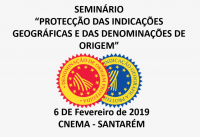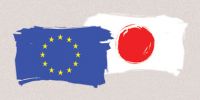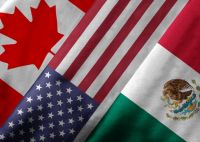06/02/2019 – oriGIn Portugal organizes in Santarém a Conference on GIs protection

On February 6, oriGIn Portugal organizes in Santarém a Conference on GIs protection. More information (in Portuguese) available @

On February 6, oriGIn Portugal organizes in Santarém a Conference on GIs protection. More information (in Portuguese) available @
#US #Canada #Mexico #Tariffs #FreeTrade #USMCA: “Bourbon whiskey” and “Tennessee whiskey” in favor to end retaliatory tariffs and approve the USMCA The Distilled Spirits Council is the Trade Association representing the leading producers and marketers of distilled spirits in the…

It has been another positive year for oriGIn and GIs. Important results were achieved in 2018, just to name a few: We monitored and commented GIs laws around the world; We raised awareness on the crucial debate concerning sustainability;…

Between the end of November and the beginning of December, three non-agricultural GIs were granted in France under Law 2014-344 (17 March 2014): “Grenat de Perpignan” (jeweler), “Tapisserie d’Aubusson” (tapestry) and “tapis d’Aubusson” (carpets). More information are available (in French): “grenat…

On 27 November, the so-called “Trilogue” (European Commission, Council and Parliament) reached a political agreement on the draft Regulation on spirit drinks (Proposal for a REGULATION OF THE EUROPEAN PARLIAMENT AND OF THE COUNCIL on the definition, presentation and labelling…

In November, the National Institute of Industrial Property (INPI) of Brazil launched a public consultation on the Draft Rules concerning the registration of GIs in the country oriGIn took this opportunity to raise an issue faced by some of its…
#Brazil #INPI #Registration: oriGIn provides comments to the national IP Office to facilitate the registration of GIs in Brazil In November, the National Institute of Industrial Property (INPI) of Brazil launched a public consultation on the Draft Rules concerning the…

A historical turning point for the world of Italian PDO and PGI Consortia: the Association of Italian GIs Consortia “AICIG” – becomes “ORIGIN ITALIA”, the Italian antenna of oriGIn. ORIGIN ITALIA gathers GI Groups as well as GI Group Associations…
{autotoc option1=value1|option2=value2|…|optionN=valueN} #Transparency #Protection: oriGIn Worldwide GIs Compilation one year after its first publication oriGIn Worldwide GIs Compilation has the objective to establish a common language in the international GIs landscape. It is an attempt to list in an alphabetical order…

The European Commission (EC), in its proposal of June 2018 for the reform of the Common Agricultural Policy – CAP set a path for the simplification and strengthening of the PDO/PGI systems (applicable to wines and agricultural products). Following this,…

On 1 October, the Trademarks Act No 2 of 2018 of Malawi came into force. The Act was published in the Malawi Gazette Supplement on 24 October. The Trademarks Act No 2 of 2018 contains as well provisions on GIs (Part…

On 12 December the EU Parliament ratified the EU/Japan Economic Partnership Agreement (EPA), following the reccomendation of the International Trade (INTA) Committee . Like in the case of the free trade agreement with Canada (CETA), once ratified, the EPA provisions in areas…
{autotoc option1=value1|option2=value2|…|optionN=valueN} Register for the ITC/oriGIn online course “Adding Value to Origin Products Through Geographical Indications” The 6th edition of the online course “Adding Value to Origin Products Through Geographical Indications (GIs)” will start on Monday 19 November. The course…
{autotoc option1=value1|option2=value2|…|optionN=valueN} #Japan #EU #EPA: the EU/Japan Economic Partnership Agreement (EPA) provisions on GIs poised to come into force by the end of the year On 5 November, the International Trade (INTA) Committee of the European Parliament recommended to approve…

Thanks to the EU-Singapore Free Trade Agreement (“EUSFTA”) which was inked by Singapore and the EU in Brussels on October 19, 2018, the way has been paved for a high level of protection for GIs in Singapore. Following the GI…
{autotoc option1=value1|option2=value2|…|optionN=valueN} Dear member, The “oriGIn Alert” is a service to keep you updated on the latest GIs developments. It is also an opportunity for you to share relevant information with our worldwide network. In this edition, we have two…

The topic of geographical indications (GIs) often sparks heated debate between interested parties. We bring together two organisations with different perspectives on GIs to discuss the best route forward for this unique form of protection…… To read the full article…

On 14 November the European Commission and the United Kingdom’s negotiators have reached a Draft agreement on the Withdrawal Agreement of the United Kingdom of Great Britain and Northern Ireland from the European Union and the European Atomic Energy Community. …

On September 28, Côte d’Ivoire became the second country to join to the Geneva Act of the Lisbon Agreement. Earlier this year, Cambodia (in March) had acceded to the treaty and the EU (in July) had launched its internal procedures…

On September 30, the United States, Mexico and Canada have concluded the United States-Mexico-Canada Agreement (USMCA), designed to replace the North American Free Trade Agreement (NAFTA). The USMCA will have to be ratified, which may not occur before early 2019.…